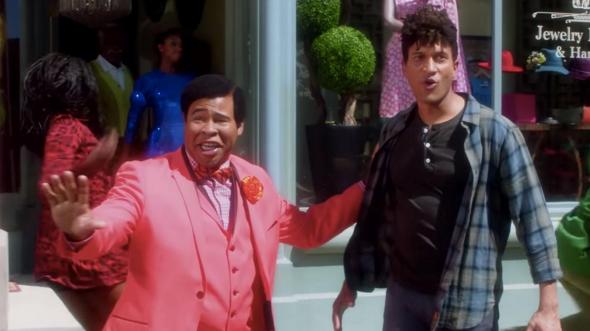It’s Hard to Nail a Sketch Show Finale. Key & Peele Did It.

Still from YouTube
The finale of a sketch comedy show is an inherently anticlimactic event. There’s no narrative to conclude, no plotlines or festering conflicts to resolve. But Key & Peele is not like other sketch shows, and its excellent, hour-long series finale, which alternated between callbacks and ambitious, off-the-wall bits, felt strangely of a piece with its stars’ body of work over the past three years.
That uncanny sense of closure was aided by the episode’s inclusion of beloved, lived-in characters. Take the final appearance of Meegan and Andre, the controlling narcissist and bro-y boyfriend who became the show’s most enduring, consistently raucous couple. In their last sketch, Andre finally musters the courage to end the relationship, which Meegan is fine with—but can she just, like, you know, ask why? Needless to say, they reconcile.
Other segments shone for the simple, aimless absurdity of their conceits. “The Morty Jebsen Show” features a Larry King-type host (Key) interviewing an up-and-coming rapper named Young Bidness (Peele). The sketch starts on a familiar beat—a celebrity affronted by media probing his personal life—but takes a left turn into pure physical comedy when Bidness limps, hops, and ultimately passes out on set while attempting to flee Jebsen’s queries.
All good stuff, but Key & Peele will be remembered largely for its adroit racial commentary, and the finale’s obvious high point was “Negrotown,” a near-classic skit that was shared a few months ago. In a recent interview, series director Peter Atencio noted that the show’s fifth season was partly comprised of sketches that were deemed too weird, unwieldy, or hard to produce when originally pitched. “Negrotown” is clearly one of those skits: A sprawling, impeccably choreographed achievement, it depicts a Technicolor “utopia for black people” where cabs stop for everyone and loan applications never get rejected.
The finale’s other bright spots were delivered by a glut of off-kilter characters, among them a man whose passion for comedy manifests in uncomfortably Nazi-esque ways; a stud who balks at a brawl while trumpeting his lust for combat; and “Continental Breakfast Guy,” who, true to form, is a tad too pleased by a minor flight upgrade. The night's best impression? Peele’s take on Ray Parker Jr., whose three volumes of “never-used hits” set a new, gut-busting benchmark for bad theme music.
Get More: Comedy Central,Funny Videos,Funny TV Shows
Some of the episode’s bits didn’t quite land, but even the missteps seemed like failures of format rather than imagination. It’s been clear for some time now that Keegan-Michael Key and Jordan Peele are far too inventive, ambitious, and sui generis to be confined to a sketch show. They seem to agree—they've already got several movies in the pipeline—but we should be thankful we got five brilliant seasons of television before they admitted it.
